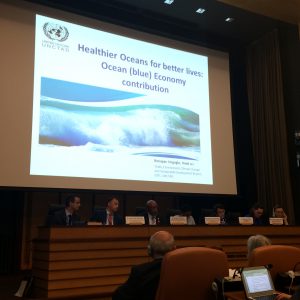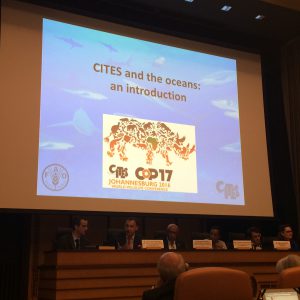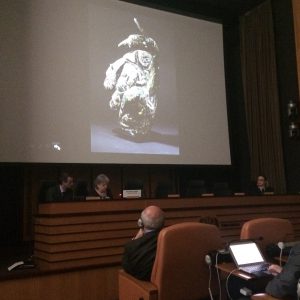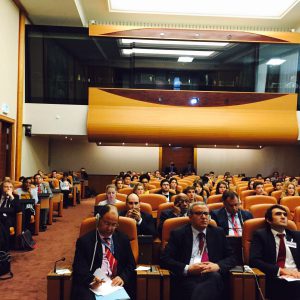Event
Healthier oceans for better lives

09 Jun 2016
15:00–17:00
Venue: Palais des Nations – Room XIV
Organization: Geneva Environment Network
This event, organized by the Permanent Missions of France, Morocco and Monaco with the support of Geneva Environment Network, discussed the conservation and sustainable use of the oceans, seas and marine resources.
Agenda
Opening of the conference
Preliminary remarks :
H.E. Ms Elisabeth LAURIN, Ambassador, Permanent Representative of France
H.E. Ms Carole LANTERI, Ambassador, Permanent Representative of Monaco
Video of H. S. H. Prince Albert II of Monaco
Screening of a movie on marine protected areas
Panel 1: Science State of play of oceans
Mr Michel JARRAUD, Secretary general emeritus of WMO
Pr Denis ALLEMAND, Scientific Director, Centre Scientifique de Monaco
Panel 2: Sustainable management of oceans
Ms Cyriaque SENDASHONGA, Director of IUCN’s Policy and Programme Group
Mr Bonapas ONGUGLO, Head of the Trade, Environment, Climate Change and Sustainable Development Branch, UNCTAD
Mr Juan Carlos VASQUEZ, Chief of Legal and Compliance Unit, CITES
Ms Christine HAFFNER SIFAKIS, Task Manager for IW Africa Portfolio, UNEP
Message from young generation: Students of the Lycée International Ferney-Voltaire
Contemporary circumpolar art and climate change: Ms Martha CERNY, Cerny Inuit Collection
Closing: H.E. Mr Mohamed AUAJJAR, Ambassador, Permanent Representative of Morocco
Short summary
Preliminary remarks were made by H.E. Amb. Elisabeth Laurin, who was thankful for the numerous participants at the meeting. She talked about the negotiations at COP21 as an important step to tackle the problems of oceans and climate change. She mentioned that this event is the part of this dynamic series to leverage the cases of coastline cities which is going to continue during COP22 in Marrakesh.
H.E. Amb. Carole Lanteri, also raised in her preliminary remarks the importance of seas, oceans and their protection.
The preliminary remarks were followed by a video of H. S. H. Prince Albert II of Monaco and a screening of a movie on marine protected areas. The Prince highlighted the importance of oceans and that Monaco is very concerned in protecting oceans and seas. The Prince mentioned that concerning the threats a scientific research centre was set up in Monaco to tackle the ocean milieu.
The 1st Panel focused on the Science State of play of oceans.
Michel Jarraud, Secretary general emeritus of WMO
- Oceans cover over 70 % of the planet and it plays an important role in climate change.
- What is observed that greenhouse gases can be absorbs by the oceans (absorbs of one-fourth of all anthropogenic CO2).
- The sea level rise accelerated which is due to two main reasons which are connecting as heating and the melting of ice caps (30 % per decade is the loss of the icepack).
- The phenomenon of El Nino and the south oscillation is really important in this issue. Member states accepted the objectives regarding to ocean protection and conservation within the SDGs.
- The ocean is represented a challenge because observations usually made by boats and satellites and planes (within the sea and in the atmosphere too), but a revolution happened and now we are able to see what is inside the water. His most important remark was that there is a need for international agreements to solve the problem of oceans.
Denis Allemand, Scientific Director, Centre Scientifique de Monaco
- The constructions what can be seen from the space are the Coral Reefs. These Coral Reefs have a numerous biodiversity (30 % of the total known marine biodiversity) in 0.1 % of sea surface area.
- Coral Reefs are key in marine ecosystems with both ecological and socio-economic importance. These are important related to food, tourism and coastal protection problems. 500 million people depends on the survival of Coral Reefs.
- Biological phenomenon exists in Coral Reefs which is the symbiosis between animal and microalgae which is a key to this ecological success.
- These Coral Reefs are unfortunately frightened e.g. by El Niño. The solution can operate locally (coastal development) or globally (it is hard to act on them, such as heating).
- The global threat is coral bleaching since the eighties and it is still increasing.
- Besides, overfishing represents a huge problem due to illegal techniques and ocean acidification results in the damage of corals.
- The impact of global changes on Coral Reefs are already visible.
The 2nd Panel covered the issues of oceans’ Sustainable management and development of oceans.
Ms. Cyriaque Sendashonga, Global Director of IUCN’s Policy and Programme Group
- Today the world faces problems regarding to the damage of ecosystem services.
- Services provided by ecosystem .e.g. aquaculture and ocean conservation (water of good quality, raw materials for feed, wild stocks) now are covered within the Sustainable Development Goals (SDGs).
- Other concept has also a huge importance, namely blue economy. IUCN contributes to the implementation of SDGs through the support of governance, education, research, guidelines and development of indicators for marine protected areas.
Juan Carlos Vasquez, Chief of Legal and Compliance Unit, CITES
- The objectives of CITES are legality, sustainability and traceability. They operate through intergovernmental processes.
- A challenge which should be solved that marine environment is not under the jurisdiction of any State. There is a need to know how we are going to comply these rules.
- One of the problems how to regulate trade from the high-seas to national areas. As a solution CITES provides the Introduction from the sea (IFS) certificate. IFS is the “Transportation into a State of specimens of any species which were taken in the marine environment not under the jurisdiction of any State”.
- There is a need for a common understanding to facilitate the standard implementation of trade controls.
Christine Haffner-Sifakis, UNEP/GEF Task Manager for the International Waters Africa Portfolio
- The last four resolutions of UNEA2 are ocean-related. The boundaries do not correspond to the actual geographical coverage of the conservation.
- She mentioned that 18 Regional Seas Conventions exists, which need transboundary cooperation to cover this issue.
- UNEP Mediterranean Action Plan (MAP) together the Barcelona Convention encourages the multi-stakeholder environment and the translation of ocean-related SDGs into National Action Plans.
- She mentioned as one of the solutions is to change of consumer lifestyles which could solve these problems.
Bonapas Onguglo, Head of the Trade, Environment, Climate Change and Sustainable Development Branch, UNCTAD
- Oceans represent a formidable economic force. It is important for preserving the oceans, for dealing with poverty and food security.
- The goal is the harmonization among policies where Ocean (Blue) Economy can contribute.
- The targets of conservation and the sustainable use of oceans, seas and marine resources are set by 2020 and one of the most important issue is to handle through this process is monitoring.
- As we reached the maximum yield of oceans, and one of the biggest problems is the illegally unregulated and unreported harvested fish ranges and global fisheries subsidies.
Abdelmalek Faraj, Director General of Fisheries Research National Institute (INRH)
- He highlighted that climate change has an impact on fish stocks together with the phenomenon of El Niño and overfishing, which represents a huge problem. It has led to dramatic consequences.
- The diminution of oxygen and all of these problems should have been tackled at the same time, not one by one.





